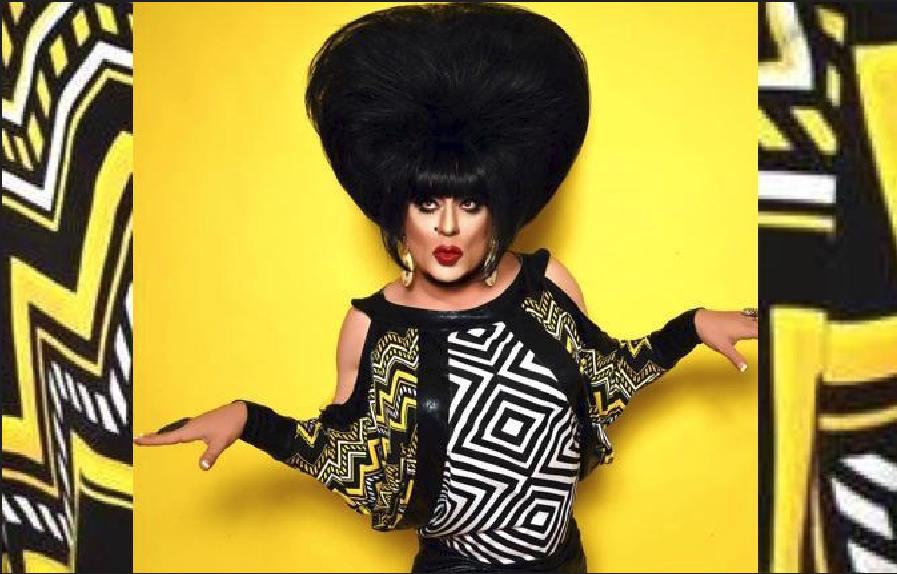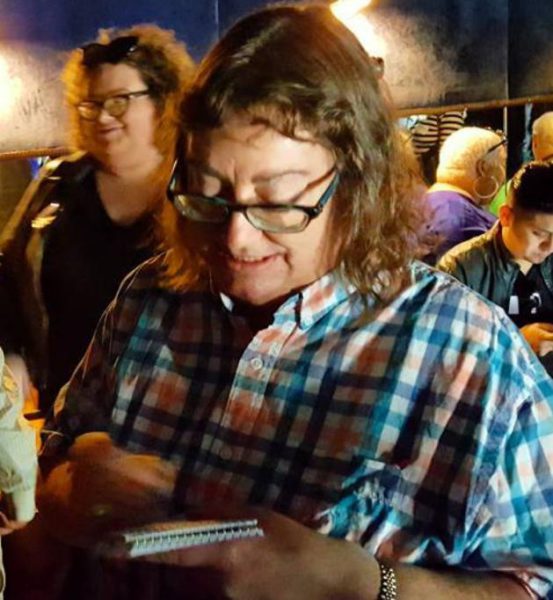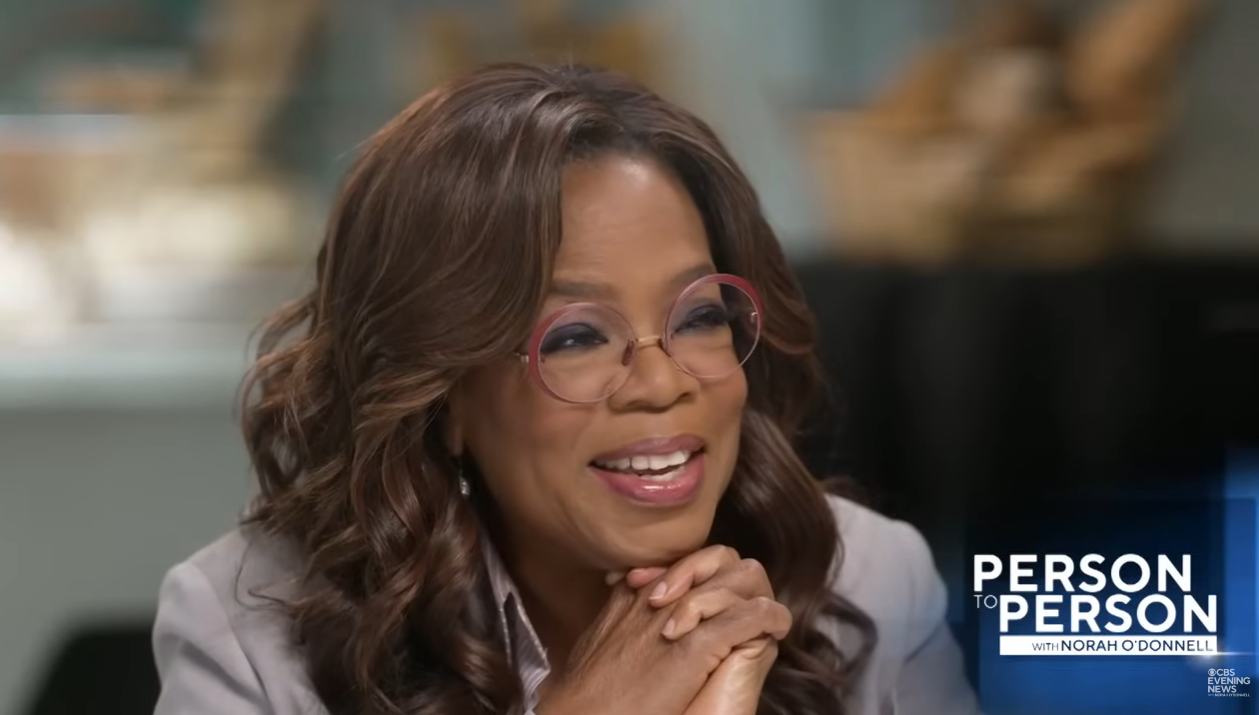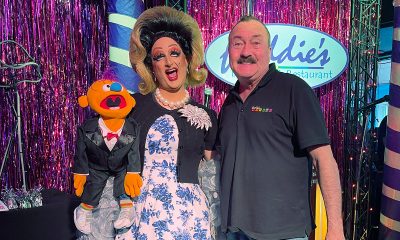Celebrity News
San Francisco drag artist Heklina dies
Stefan Grygelko passed away in London


By Cynthia Laird | Stefan Grygelko, better known as his drag persona Heklina, has died, his longtime friend Joshua Grannell (Peaches Christ) wrote on Facebook April 3.
The two were in London where they were appearing in the “Mommie Queerest” show there, Grannell wrote, adding that he had gone to pick up Heklina that day.
“I do not know the cause of death yet,” Grannell wrote. “I know this is shocking news and I am beyond stunned, but I wanted to let folks know what has happened. Heklina is not just my best friend, but a beloved icon of our community.”
The news shocked and saddened his friends back in San Francisco, with fellow drag queen Sister Roma writing on their Twitter account that she was “absolutely devastated” to learn of the passing of his friend and collaborator for two-plus decades.
“She is one of the funniest people I’ve ever known. This is a nightmare,” wrote Roma, a member of the drag philanthropy group the Sisters of Perpetual Indulgence, in a tweet.
Oasis, the LGBTQ nightclub in which Heklina was once a part-owner, expressed its sadness and said it would open at 4 p.m. Monday.
“We are shocked and devastated to learn of the passing of Heklina today,” the club wrote. “Oasis will be open at 4 p.m. for drinks, stories, and community, if you’d like to come by. Sending love to all.”
Gay former state assemblymember Tom Ammiano told the BAR he will miss the drag artist.
“A true professional [and] with drag under attack her passing is especially wounding,” wrote Ammiano, who also served on the San Francisco Board of Supervisors and school board. “As an aside, she bartended at events for folks with special needs at the Oasis [and] as a former special education teacher, I loved her for that.”
As Heklina, Grygelko was known for founding the old Trannyshack drag show in 1996 at the old Stud bar. (The name of the show was later changed to “Mother.”)
At the start of each Trannyshack, San Francisco’s outlandish, no-holds-barred Tuesday night drag show, a snippet of the old “Muppet Show” theme music warned “it’s a kind of torture, to have to watch the show,” as the Bay Area Reporter reported in 2008.
The joke belied the fact that the performances were more than just boys in dresses lip-synching to pop ballads or camp classics. The weekly shenanigans often masked what in reality was a uniquely queer riff on the political, social, racial, and gender controversies of the day.
Heklina invited not just drag queens — many of whom went on to become stars in their own right — but also female performers, known as faux queens, and drag kings to share her stage. By doing so, Heklina threw out the rulebook on what it meant to be a drag performer.
Adriana Roberts, a trans woman and an early Trannyshack performer, penned a tribute on Facebook.
“She was a Master Class in successful Nightlife Production: wrangling order from chaos, managing a stage, managing a crowd, putting down hecklers, assembling trusted crews, booking budding queens, promoting events, following one’s heart — but also always being aware of what actually sells,” Roberts wrote. “And she did it all with snark, wit, and balance for over 25 years.”
Roberts, a former production designer at the BAR, wrote, “Coming from a punk rock ethos, she created a space that welcomed performers from across the gender spectrum, at a time when drag was VERY codified into TIRED (her words) tropes of men in sequined gowns doing diva lip-syncs. None of us realized it at the time, but she helped revolutionize the concept of what drag could be, breaking its mold years before the rest of the world caught on.”
As the BAR noted in a March 2022 article, since the early 1990s, Heklina had been a mainstay in Bay Area queer nightlife. From the first irreverent drag nights at the Stud, to Trannyshack’s expansion at DNA Lounge that included annual contests, Heklina has often hosted the most prominent drag and nightlife events which included her own numbers.
In 2015, along with D’Arcy Drollinger and other investors, Heklina opened Oasis in South of Market; the same building that once housed the original Oasis. The new nightclub has become popular for not only drag shows and DJed dance nights, but comic plays and musicals, cabaret concerts and community fundraisers. Heklina later sold her share of Oasis ownership and moved to Palm Springs, while still keeping a foothold in the Bay Area’s nightlife scene.
And, of course, Heklina was known for her deadpan line delivery as Dorothy (Bea Arthur’s character) in stage productions of episodes of the classic sitcom “The Golden Girls.” The long-running show became an annual holiday tradition in San Francisco.
State Sen. Scott Wiener (D-San Francisco) issued the following statement Monday afternoon:
“I am absolutely devastated. Heklina was an icon in the truest sense — funny, caring, outrageous, and brave. I first saw Heklina perform when I was a young gay man in the 1990s, new to San Francisco. Over the years, I got to know her and helped her find a space for Oasis. I’ve rarely worked with someone as fierce, creative, and dedicated.
“Heklina created events and community spaces that spun glitter and giant wigs and raucous jokes into a feeling of home. She was fiercely outspoken and always stood up for her friends and community. She was the soul of San Francisco, and it’s hard to imagine the city without her.
“Heklina was also a staunch defender of drag — which is under extreme attack right now — and created opportunities for young drag queens to find their space. While we grieve, we must honor her memory by remembering the joy she brought us and the importance of the art form to which she dedicated her life.”
Nguyen Pham, board president of San Francisco Pride said in an emailed statement:
“Personally, I’ve been honored and grateful to have engaged with Heklina directly, as well as attended her spectacularly memorable productions, numerous times over the years. I know that her unique brand of radically inclusive drag art has evoked so much pure joy from countless community members and allies for many generations. She was unstoppable and a master without parallel.”
************************************************************************************

Cynthia Laird is the Editor-In-Chief and News Editor of the Bay Area Reporter. Laird is a long time journalist in the SF Bay Area having studied Government-Journalism at California State University, Sacramento. She and her wife live in Oakland.
*************************
The preceding article was previously published by the Bay Area Reporter and is republished by permission.

In a move aimed at celebrating the beauty, brilliance and resilience of the LGBTQ community, the Human Rights Campaign unveiled the “Queer Renaissance Syllabus” that Beyoncé’s “Renaissance” album inspired.
Curated by Justin Calhoun, Leslie Hall and Chauna Lawson of the HRC’s Historically Black Colleges and Universities Program, the syllabus includes a variety of academic articles, essays, films and other media rooted in Black queer and feminist studies. Each piece is directly inspired by the tracks on Beyoncé’s Billboard 200-topping dance album, “Renaissance.”
Beyoncé’s album “Renaissance” stands as a cultural milestone, celebrating the Black queer roots of dance music while shedding light on overlooked Black queer artists. Inspired by her late-Uncle Johnny, the album not only garnered critical acclaim but also shed light on the often marginalized contributions of Black queer artists. Winning four Grammys and yielding chart-topping hits like “Break My Soul” and “Cuff It,” the album sparked discussions about economic impact and cultural representation.
Amid its success, legislative challenges arose, with Florida and Texas enacting bans on DEI initiatives in public colleges. Recognizing the album’s transformative potential, HRC developed the “Queer Renaissance Syllabus” to leverage its impact for education and activism.
Tailored for educators, youth-serving professionals, DEI practitioners, higher education leaders and admirers of Beyoncé’s artistry, the syllabus aims to encourage meaningful discussions, enrich lesson plans, and explore innovative ways to honor the vibrancy and significance of LGBTQ individuals and their culture.
With six themes anchoring the syllabus, ranging from “intersectionality and inclusivity” to “social justice and activism,” it provides a comprehensive exploration of various facets of LGBTQ experiences and expressions. Fan-favorite tracks from the album are paired with scholarly readings, offering insights into empowerment, self-acceptance and the transformative power of artistic expression. The syllabus also reinforces HRC’s efforts to highlight, amplify and re-center Black and queer voices.
By providing links to articles, books, podcasts and interviews, each associated with a song from the album, it celebrates the rich cultural heritage and contributions of the Black queer community.
The concluding section of the syllabus includes Beyoncé’s tribute to O’Shea Sibley, a young Black queer person who was murdered in Brooklyn, N.Y., last July while voguing to “Renaissance” songs at a gas station. HRC also includes a statement that condemns hate crimes.
Celebrity News
GLAAD to honor Oprah Winfrey with Lifetime Achievement Award
Ceremony to take place in Los Angeles on Thursday

To the pantheon of LGBTQ allies honored by the Gay and Lesbian Alliance Against Defamation with the Lifetime Achievement Award, luminaries such as Barbra Streisand, Cher and Liza Minnelli enter Oprah Winfrey.
The global media icon, philanthropist and longtime advocate for LGBTQ rights will be honored with the prestigious Lifetime Achievement Award at the 35th annual GLAAD Media Awards in Los Angeles on March 14, 2024. The award honors Winfrey’s unwavering commitment to promoting equality, acceptance and understanding for the LGBTQ community throughout her remarkable career, cementing her place among the most influential and dedicated allies in the fight for equality.
Born in rural Mississippi and raised in Milwaukee and Nashville, Winfrey’s journey to becoming a media mogul and cultural influencer began when she was just a teenager. At the age of 19, she landed her first job in media as a young intern at WLAC-TV (now WTVF-TV), the CBS affiliate in Nashville. Her natural talent and charisma quickly earned her a position as the first African American female news anchor at the station, setting the stage for a groundbreaking career that would span decades.
In 1984, Winfrey relocated to Chicago to host WLS-TV’s morning talk show, “AM Chicago.” Little did she know that this move would be the catalyst for her meteoric rise to fame. The show, later renamed “The Oprah Winfrey Show,” became a cultural phenomenon, attracting millions of viewers across the U.S. and in more than 100 countries worldwide. Winfrey’s unique blend of empathy, wisdom and storytelling resonated with audiences, making her one of the most beloved and influential figures in media history.
A pivotal moment in Winfrey’s career came in 1986 when she negotiated a groundbreaking contract with King World Productions, the company founded by legendary boxing promoter Don King. The contract gave Winfrey full ownership of “The Oprah Winfrey Show” and allowed her to produce the show through her own production company, Harpo Productions. This unprecedented deal demonstrated Winfrey’s business acumen and laid the foundation for her future success, paving the way for her to become one of the wealthiest and most powerful women in the world.
Throughout her career, Winfrey has consistently used her platform to shine a light on important social issues, including LGBTQ rights, racial equality and women’s empowerment. Her compassionate and empathetic approach to storytelling has helped to break down barriers, challenge stereotypes and promote understanding and acceptance of marginalized communities.
In 1997, Winfrey featured Ellen DeGeneres on her talk show, providing a platform for the comedian to publicly come out as gay. This groundbreaking episode helped to normalize LGBTQ visibility in mainstream media and paved the way for greater acceptance and understanding of the community.
Winfrey’s dedication to LGBTQ equality is further evident in her portrayal of strong, complex characters like Sofia in the acclaimed 1985 film “The Color Purple,” which featured one of the first same-sex kisses in a mainstream Hollywood production.
In addition to her work in television and film, Winfrey has built a vast media empire that includes the creation of the Oprah Winfrey Network, a partnership with Discovery Communications, and the publication of O, the Oprah Magazine. Her business savvy and entrepreneurial spirit have made her one of the most successful and influential figures in the entertainment industry, with a net worth estimated at $2.6 billion as of 2023.
But Winfrey’s impact extends far beyond her financial success. She has also been a tireless advocate for education and philanthropy, donating millions of dollars to charitable causes and establishing the Oprah Winfrey Leadership Academy for Girls in South Africa, which provides education and support for underprivileged girls. Winfrey’s commitment to giving back to the communities that have supported her throughout her journey is a testament to her character and her belief in the power of education to transform lives.
In her personal life, Winfrey is known for her love of reading, her commitment to personal growth and self-improvement and her close friendships with celebrities like Gayle King and Tyler Perry. Despite years of speculation and rumors surrounding the nature of her relationship with King, Winfrey has always maintained a dignified silence, emphasizing the importance of love, acceptance and the right to privacy. Her unwavering support for the LGBTQ community, both in her professional and personal life, has made her a role model and a beacon of hope for millions of people around the world.
Winfrey’s fierce determination to fight discrimination and promote equality has been a constant throughout her career. In 1987, she confronted racism head-on by taking her show to the predominantly white community of Forsyth County, Ga. During a heated town hall meeting, one audience member expressed his fear of racial integration, stating, “I’m afraid of [Black people] coming to Forsyth County.” Winfrey responded with her signature grace and wisdom, saying, “I hear your fear. When I look at your face, I see the fear. But how are you going to get past it if you don’t allow yourself the opportunity to get to know other people?” This powerful exchange demonstrated Winfrey’s unique ability to facilitate difficult conversations and promote understanding across racial divides.
From her willingness to confront white segregationists in Georgia to her ongoing efforts to elevate diverse voices and stories through her work in television, film and theater, Winfrey has always been a champion for social justice. Her legacy as a trailblazer and an advocate for the marginalized will continue to inspire generations to come.
In the words of GLAAD President Sarah Kate Ellis, “Oprah Winfrey has been a beacon of hope and inspiration for the LGBTQ community for decades. Her groundbreaking work in media has not only entertained and informed millions of people around the world, but it has also helped to change hearts and minds and promote greater understanding and acceptance for our community.”
Maya Angelou, one of Winfrey’s most important influences, put it best; “I’ve learned that people will forget what you said, people will forget what you did, but people will never forget how you made them feel.” As Winfrey accepts the Lifetime Achievement Award, her legacy of compassion, empathy and unwavering commitment to equality serves as a powerful reminder of the enduring impact of a life well-lived.
The GLAAD Media Awards, which have been held annually since 1990, recognize and honor media for their fair, accurate and inclusive representations of the LGBTQ community. As As Winfrey prepares to accept this prestigious award on March 14, 2024, her extraordinary journey and unwavering commitment to LGBTQ equality serve as a powerful reminder of the impact that one person can have on the world.
Celebrity News
High flying and adored, Chita Rivera charts her path to heaven
D.C. native passed away on Tuesday at 91
She never danced Evita, but she was still “high flying adored.” Today, Chita Rivera has left the stage, but she clearly will never dance out of the hearts of all who loved, admired and respected her.
Clearly, she was a talent no one could reckon. Born in 1933 as Dolores Conchita Figueroa del Rivero, Chita Rivera’s rise to stardom began with ballet classes at the age of 11. Her undeniable talent led her from the School of American Ballet to the spotlight of Broadway, where she broke ground as one of the first Hispanic women to achieve leading roles in theater during a time when representation was minimal.
She is known in critical circles as “the greatest musical-theater dancer ever.” Jason Alexander has been one of the first Broadway voices to speak of her passing and said, “This extraordinary woman, the incomparable. Chita Rivera was one of the greatest spirits and colleagues I’ve ever known. She set the bar in every way. I will cherish her always. Dance in heaven, my friend.”
She was the original Velma Kelly in “Chicago” and racked up 10 Tony nominations and two wins. Her performances were life changing. In 2009, she was presented with the Presidential Medal of Freedom for her contributions to American culture.
It is not a surprise that she was revered at her passing. What was shocking was that she passed at all. If there was anyone who you could anticipate had the spirit and will to live forever, it was Chita Rivera. She somehow seemed immortal.
And she loved LGBTQ people.
It was a mere decade ago when Rivera chose to celebrate her 80th birthday by headlining a sold-out show, “Chita-A Celebration,” at the August Wilson Theater. The event benefited Broadway Cares Equity Fights AIDS.
“The roar for her was deafening,” they report. After six rapturous standing ovations, Rivera stood proud, having raised $413,660 for the cause in that single performance. “I had no idea celebrating my 100th birthday would be so much fun,” quipped the then 80-year old.
If Rivera was at all a diva, she was a generous one. “I’m not comfortable with just me, me, me. That’s boring,” she has said. Rivera was a publicly vocal advocate for LGBTQ rights. She was among the luminaries who supported many AIDS benefit concerts and took a firm stance for equality. Through her philanthropic efforts, Rivera contributed to nurturing acceptance and championing the visibility of LGBTQ individuals in the arts.
Rivera was personally touched by the AIDS crisis having lost dozens of friends to the disease. She spoke publicly about it when she was performing in “Kiss of a Spider Woman.” “It’s a very difficult role for me to play in these times, when you’ve lost so many friends, and suddenly you’re standing there and you’re playing ‘Death.’ And you’ve just heard about some friends (who have died), you know? Sometimes it’s really, really hard. But then I get all kinds of things from it: I get strength from having to go right through it. When Larry Kert (her “West Side Story” co-star) passed away, I thought I saw him in the balcony when I was singing “Kiss of the Spider Woman.” There’s a lot going on. It’s a serious play, an important play. And this a good time right now because we need all of these channels open. We gotta get them in there to get the message out there.”
GLAAD put out a statement at her passing on Tuesday, “Broadway legend Chita Rivera has sadly passed away at age 91. Rivera spent much of her long career advocating for LGBTQ people and people living with HIV and AIDS. Our hearts go out to everyone who loved her.”
GLAAD President Sara Kate Ellis, wrote her own personal tribute, “So sad to hear about the death of Chita Rivera. I had the pleasure of spending time with her at Remember the Ribbon: A Tribute to World AIDS Day in 2022. She spent much of her life advocating for the LGBTQ community and people living with HIV and AIDS. Sending love to her family.”
Rivera observed of her own legacy, “Many of the shows I danced in don’t exist on film, but they do exist in the memories of those who were in the theater for that single moment in time. And nothing can replace that.”
She lived her life in single moments. The record of what she accomplished is imbedded in hearts, minds, memories and the forever told stories of Broadway. She will always be known by reputation and by legacy. As she makes her way up the red carpet, we can only hope she is greeted by her throng of angels, all those who passed before her. They know the exact name that we, who she has left, should have for her.
Legend.
-

 State Department2 days ago
State Department2 days agoState Department releases annual human rights report
-

 Maryland4 days ago
Maryland4 days agoJoe Vogel campaign holds ‘Big Gay Canvass Kickoff’
-

 Politics3 days ago
Politics3 days agoSmithsonian staff concerned about future of LGBTQ programming amid GOP scrutiny
-

 The White House1 day ago
The White House1 day agoWhite House debuts action plan targeting pollutants in drinking water












